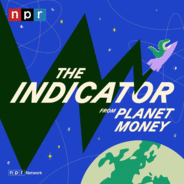As Warren Buffett aged, he became a different sort of figure. He transformed from short-term investor into long-term builder. He used Berkshire Hathaway to start buying companies and build an empire. Today on the show, how did Buffett’s fame become an investment tool and how did he handle the biggest crisis of his career? Related episodes: Planet Money Summer School 2: Index Funds & The BetBrilliant vs. Boring For sponsor-free episodes of The Indicator from Planet Money, subscribe to Planet Money+ via Apple Podcasts or at plus.npr.org. Fact-checking by Sierra Juarez. Music by Drop Electric. Find us: TikTok, Instagram, Facebook, Newsletter. Learn more about sponsor message choices: podcastchoices.com/adchoicesNPR Privacy Policy

Wirtschaft
The Indicator from Planet Money Folgen
A bite-sized show about big ideas. From the people who make Planet Money, The Indicator helps you make sense of what's happening in today's economy. It's a quick hit of insight into money, work, and business. Monday through Friday, in 10 minutes or less.
Folgen von The Indicator from Planet Money
300 Folgen
-
Folge vom 23.12.2025The worst year of Warren Buffett’s career
-
Folge vom 22.12.2025The spite acquisition that launched Warren BuffettWith an unprecedented decades-long run of success, Warren Buffett is retiring on December 31, 2025. Buffett’s turning point began with the acquisition of a failing textile mill called Berkshire Hathaway. What began as a “terrible mistake” became the foundation for his empire. Today on the show, how did Buffett become this legendary figure? Related episodes: Planet Money Summer School 2: Index Funds & The BetBrilliant vs. Boring For sponsor-free episodes of The Indicator from Planet Money, subscribe to Planet Money+ via Apple Podcasts or at plus.npr.org. Fact-checking by Sierra Juarez. Music by Drop Electric. Find us: TikTok, Instagram, Facebook, Newsletter. Learn more about sponsor message choices: podcastchoices.com/adchoicesNPR Privacy Policy
-
Folge vom 19.12.2025Tariffs. Consumer sentiment. Cape Ratio. Pick The Indicator of The Year!2025 was a wild year for the U.S. economy. Tariffs transformed the global economy, consumer sentiment hit near-historic lows, and the stock market hit scary, spooky, blood-curdling new heights! So … which of these economic stories defined the year? Our hosts from Planet Money and The Indicator duke it out during our annual … Family Feud!Tell us who you think has THE indicator of the year by emailing us at indicator@npr.org. Put “Family Feud” in the subject line. Related episodes:The Indicators of this year and next This indicator hasn’t flashed this red since the dot-com bubble What would it mean to actually refund the tariffs?For sponsor-free episodes of The Indicator from Planet Money, subscribe to Planet Money+ via Apple Podcasts or at plus.npr.org. Fact-checking by Corey Bridges. Music by Drop Electric. Find us: TikTok, Instagram, Facebook, Newsletter. Learn more about sponsor message choices: podcastchoices.com/adchoicesNPR Privacy Policy
-
Folge vom 18.12.2025Catching up with a fired federal worker, a shrimper and a fraudsterAfter a firehose of economic news in 2025, we wanted to check back on some of the people we’ve heard from on our show. Today, we check in with a former federal employee caught in the Trump administration's wood chipper, a Louisiana shrimper on Trump’s tariffs and an update on a financial aid scam. Related episodes: Why do shrimpers like tariffs? What’s the long-term cost of federal layoffs? A big bank’s mistake, explained For sponsor-free episodes of The Indicator from Planet Money, subscribe to Planet Money+ via Apple Podcasts or at plus.npr.org. Fact-checking by Sierra Juarez. Music by Drop Electric. Find us: TikTok, Instagram, Facebook, Newsletter. Learn more about sponsor message choices: podcastchoices.com/adchoicesNPR Privacy Policy
